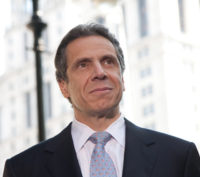On March 31, 2021, New York Governor Andrew Cuomo signed The Marijuana Revenue and Taxation Act (MRTA) into law, legalizing adult use, home cultivation and possession of cannabis for adults over 21 immediately. Upon signing the bill this morning, previous cannabis-related convictions are automatically expunged, according to the Governor.
The bill establishes the Office of Cannabis Management, which will launch and manage the regulatory system for the commercial cannabis market in New York.
According to Steve Schain, senior attorney at Hoban Law Group, the Office of Cannabis Management will have a five-member board that will oversee not just the adult use cannabis market, but also medical cannabis as well as the state’s hemp market. For the medical market, the new legislation provides for more patient caregivers, home cultivation and an expanded list of qualifying conditions.

Image: Chris Rank, Flickr
Troy Smit, deputy director of the New York NORML chapter, says the bill might not be perfect, but it’s a massive win for the cannabis community. “It’s taken a great amount of work and perseverance by activists, patients, and consumers, to go from being the cannabis arrest capital of the world, to lead the world with a legalized market dedicated to equity, diversity, and inclusion,” says Smith. “This might not be the perfect piece of legislation, but today, cannabis consumers can hold their heads high and smell the flowers.”
The MRTA sets up a two-tier licensing structure that separates growing and processing licenses from dispensary licenses. The bill includes a social equity aspect that requires 50% of the licenses to be awarded to, “minority or women-owned business enterprise, service-disabled veterans or distressed farmers,” says Schain.

Image: Rodrigo Paredes, Flickr
Melissa Moore, New York State director of the Drug Policy Alliance, says she’s proud of the social equity plan the bill puts in place. “Let’s be clear — the Marijuana Regulation and Taxation Act is an outright victory for the communities hit hardest by the failed war on drugs,” says Moore. “By placing community reinvestment, social equity, and justice front and center, this law is the new gold standard for reform efforts nationwide. Today we celebrate, tomorrow we work hard to make sure this law is implemented fairly and justly for all New Yorkers.”
Schain says the new tax structure in the bill shifts to the retail level, with a 9% excise tax and 4%-of-the-retail-price local excise tax (split 25%/75% between the respective counties and municipalities). Revenue from cannabis taxes will enter a fund where 40% will go to education, 40% to community grants reinvestment fund and 20% to drug treatment and public education fund.
It appears that businesses already established in New York’s medical market get a head start on the new adult use market, while other businesses enter the license application process, according to Schain. “Although the existing Medical Marijuana licensees should be able to immediately to sell Adult-Use Cannabis, it will take up to two years for the New York’s Adult Use Program to launch and open sales to the public,” says Schain.






